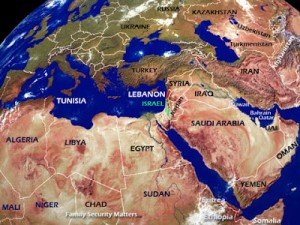Trying to Drag the Middle East into the 21st Century
Islam and democracy do not mix. What the Egyptian and Iranian revolutions have in common is the support of many different factions that brought them about, but once Islamists are in power, Sharia law drags a nation back to the seventh century.

By Alan Caruba
I am beginning to miss some of the dictators who ruled the Middle East for the past forty years or so.
Even Iraq’s Saddam Hussein was considered useful when, in the 1980s, he kept busy invading Iran. The U.S. didn’t lose any sleep over that, but when he invaded Kuwait, Bush41 concluded Saddam had bigger conquests in mind and put together a coalition to push him back inside his borders.
Bush43 didn’t even need an Iraqi invasion to justify sending another force to find him. Instead he and his neocons conjured up warehouses filled with weapons of mass destruction which were never found. Oops! It’s not reported much, but Iraq, now that the U.S. forces are gone, is back to the bad old days of Sunni-Shiite warfare and is, for all intents and purposes, an Iranian satellite.
One result of the past decade is a lot of Americans who never want to see one of our warriors set foot in the Middle East for a very long time. Lots of luck with that.
The kind of dictators the U.S. and the rest of the world tolerated were the likes of those who kept the lid on Libya, Tunisia, Syria, and especially Egypt. The monarchs in Saudi Arabia, Kuwait, the United Arab Emirates continue to hold power.
Diplomatically we didn’t even have a beef with Syria’s father-and-son dictators so long as they didn’t invade Israel. It’s worth recalling that Obama and Hillary Clinton called Bashar Assad “a reformer” when they took over U.S. foreign policy. It is anyone’s guess if the civil war in Syria will turn out well for Assad’s opponents.
Bashar is doing what his father, the previous dictator, did; slaughtering lots of people to discourage the rest. The West, preoccupied with its financial problems, is not inclined to get involved. Russia, China and most importantly, Iran, have made it clear that Bashar is their boy.
Always a major player in Mideast politics, Egypt under Gamal Abdel Nasser Egypt fought three wars with Israel, losing all of them. The famed Six Day in 1967 provided the rest of the region with a good reason not to start another one. After a heart attack killed Nassar, he was followed in office by Anwar El Sadat from 1970 until his assassination in 1981. Hosni Mubarack took over after that.
Sadat signed a peace treaty with Israel, one that has remained in place, but which is imperiled by the rise of Egypt’s Muslim Brotherhood. The Egyptian military are in no hurry to get into another war so, last week, Hosni Mubarack’s supreme court appointees ruled that the current parliament is unconstitutional and that Mubarack’s vice president can stay in office for, well, forever or until he gets assassinated.
The Egyptian military has just granted itself sweeping powers, saying the elections on Sunday are invalid until a permanent constitution is drawn up. The Muslim Brotherhood has declared that its candidate, Mohammed Mursi, won the election.
Despite the “Arab Spring” and the crowds in Cairo’s Tahrir Square, it doesn’t look like they are going to get a government that provides Western-style democratic freedoms. Islam and democracy do not mix. What the Egyptian and Iranian revolutions have in common is the support of many different factions that brought them about, but once Islamists are in power, Sharia law drags a nation back to the seventh century.
With the sole exception of Israel, there is no true democracy in the Middle East.
The wild card is still Iran. Since the Islamic Revolution in 1979 Iran has been the poster boy for every awful thing an Islamic nation represents to the rest of the world. Syria has been an Iranian satellite for decades, working closely with the mullah regime. To say that Iran is nervous about losing Assad is an understatement.
Even Turkey has signaled that it would be happier with a predictable Assad dictatorship than an alternative. Turkey was once an exception in the Middle East with a secular government is now firmly in the Islamist grip.
Under pressure from the West regarding its nuclear weapons ambitions, Iran is likely to try to distract attention by creating a conflict with Israel. And Israel knows it even if no one else does.
Iran’s other problem is more fundamental to the ability of the mullahs to retain control and that is the falling price of oil. That was the major factor in the collapse of the former Soviet Union in 1991.
As the European Union struggles to maintain his financial and political coalition and the U.S. is focusing on the forthcoming national elections, the Middle East is waiting on the outcome of the Syrian civil war and Egypt is back to square one so far as an elected government is concerned.
It has the look of a perfect storm.
© Alan Caruba, 2012
Help Make A Difference By Sharing These Articles On Facebook, Twitter And Elsewhere:
